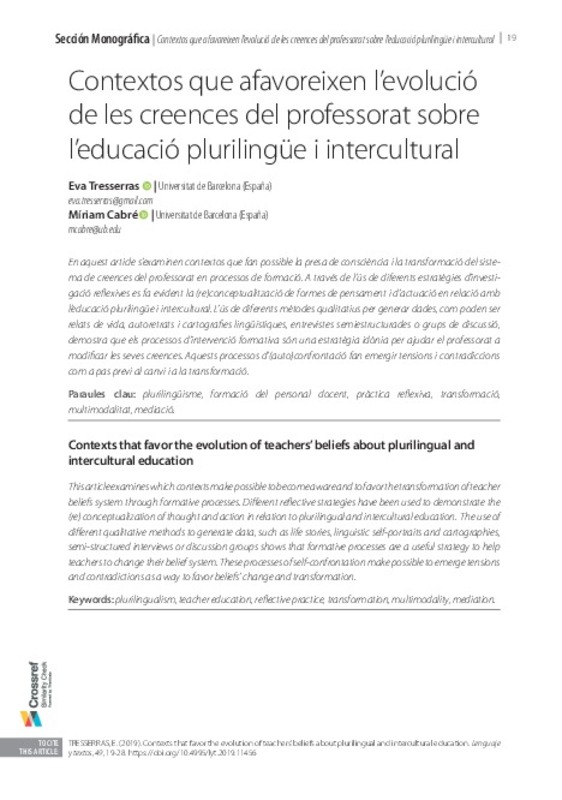Aguilar Ródenas, C. (2017). La DLL en la universidad pública: una aproximación al estado de la cuestión en la formación inicial de maestros y maestras. Parte II.. Lenguaje y Textos, 0(45), 29-42. https://doi.org/10.4995/lyt.2017.6735
Cabré, M. (en premsa). The development of the plurilingual education through multimodal reflection in Teacher Education: A case study of a pre-service teacher's beliefs about language education. Canadian Modern Language Review.
Cabré, M. (2018). La competència plurilingüe en la formació inicial de mestres. Estudi longitudinal de casos sobre l'evolució de les creences relacionades amb l'educació plurilingüe. Tesi Doctoral. Universitat de Barcelona.
[+]
Aguilar Ródenas, C. (2017). La DLL en la universidad pública: una aproximación al estado de la cuestión en la formación inicial de maestros y maestras. Parte II.. Lenguaje y Textos, 0(45), 29-42. https://doi.org/10.4995/lyt.2017.6735
Cabré, M. (en premsa). The development of the plurilingual education through multimodal reflection in Teacher Education: A case study of a pre-service teacher's beliefs about language education. Canadian Modern Language Review.
Cabré, M. (2018). La competència plurilingüe en la formació inicial de mestres. Estudi longitudinal de casos sobre l'evolució de les creences relacionades amb l'educació plurilingüe. Tesi Doctoral. Universitat de Barcelona.
Cabré, M., i Palou, J. (2018). La competencia plurilingüe en la formación inicial de maestros: estudio de las trayectorias de aprendizaje de lenguas de dos maestros en formación inicial. Revista Docencia e investigación, 28, 6-26.
Cabré, M., i Tresserras E. (2017). La resistencia como oportunidad de cambio. Investigar para innovar (Tema del mes) en Cuadernos de Pedagogía 481, 65-68.
Carrasco, E. (2013). Los (futuros) docentes frente a la competència plurilingüe (Grenoble/Barcelona). Lenguaje y textos, 37, 91-100.
Civera, I., i Codina, R. (2017). El enfoque multimodal para el estudio de las creencias. Investigar para innovar (Tema del mes) en Cuadernos de Pedagogía, 481, 60-64.
Consell d'Europa. (2018). Common European Framework of Reference for Languages: Learning, teaching, assessment. Companion volume with new descriptors. Language Policy Division. Estrasburg: Consell d'Europa.
Engeström, Y. (2012). Whatever happened to process theories of learning? Learning, Culture and Social Interaction, 1, 45-56.
Esteve, O. (2013). Entre la práctica y la teoría. Comprender para actuar. Ikastaria(19), 13-36.
Esteve, O.,Fernández, F.,Martin Peris, E. and Atienza, E. (2017). The Integrated Plurilingual Approach: A didactic model providing guidance to Spanish schools for reconceptualizing the teaching of additional languages. Language and Sociocultural Theory, 4 (1), pp. 1-24.
Kalaja, P., Alanen, R., i Dufva, H. (2008). Self-portraits of EFL learners: Finnish students draw and tell. Dins de P. Kalaja, V. Menezes, i A. Mª. F. Barcelos (Eds.), Narratives of learning and teaching EFL (pp. 186-198). Basingstoke: Palgrave Macmillan.
Korthagen, F. A. (2001). Linking Practice and Theory. The Pedagogy of Realistic Teacher Education. London: LEA.
Johnson, K. E. i Golombek, P. R. (2016). Mindful L2 teacher education. New York, NY: Routledge.
Lantolf, J. i Esteve, O. (en premsa). Concept-Based Instruction for Concept-Based Instruction: A Model for Language Teacher Education. In M. Sato, and Sh. Loewen, eds. Evidence-based second language pedagogy: A collection of Instructed Second Language Acquisition studies. New York: Routledge.
Lantolf, J. P. i Poehner, M. E. (2014). Sociocultural Theory and the Pedagogical Imperative in L2 Education: Vygotskian Praxis and the Research/Practice Divide. New York, NY and London, UK: Routledge.
Melo-Pfeifer, S. (2015). Multilingual awareness and heritage language education: Children's multimodal representations of their multilingualism. Language Awareness, 24 (3), 197-215. https://doi.org/10.1080/09658416.2015.1072208
Negueruela-Azarola, E. (2011). Beliefs as conceptualizing activity: A dialectical approach for the second language classroom. System 39: 359−369.
Palou. J, i Cabré, M. (2017). Beliefs regarding plurilingual competence: the perspective in Catalonia through a case study of a pre-service teacher. Modern Journal of Language Teaching Methods (MJLTM), 7 (8), 63-75.
Pérez-Peitx, M., Civera, I., i Palou, J. (2018). Awareness of Plurilingual Competence in Teacher Education. Dins de P. Kalaja, i S. Melo-Pfeifer (Eds.), More than words: The lives and worlds of multilinguals (Cap.13). Bristol: Multilingual Matters.
Prasad, G. (2014). Portraits of Plurilingualism in a French International School in Toronto: Exploring the Role of Visual Methods to Access Students' Representations of their Linguistically Diverse Identities. The Canadian Journal of Applied Linguistics, 17 (1), 51-77.
Tresserras, E. (2017). Contradiccions que emergeixen de la reflexió sobre la pràctica docent en contextos plurilingües i interculturals. Tesi doctoral. Barcelona: Universitat de Barcelona.
Vygotsky, L. S. (1978). Mind in society: The development of higher psychological processes. M. Cole, V. John-Steiner, S. Scribner and E. Souberman (Eds.). Cambridge, MA: Harvard University Press.
Vygotsky, L. S. (1986). Thought and Language. The MiT Press. Cambridge, Massachusetts: London, England.
Zimmermann, M., Levisen, C., Beck, f. G., i van Scherpenberg, C. (2015). Please pass me the skin coloured crayon! Semantics, socialisation, and folk models of race in contemporary Europe. Language Sciences, 49, 35-50. https://doi.org/10.1016/j.langsci.2014.07.011
[-]








